UMMC’s ‘veteran’ scholars reveal institutional secrets for incoming students
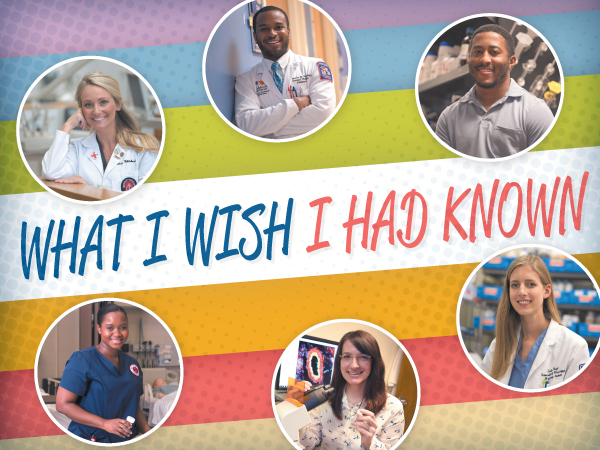
Published in News Stories on August 18, 2016
With six schools, four hospitals, state-of-the-art research facilities, more than 10,000 employees and 3,000 students, the Medical Center campus can be an intimidating place. Complicated wayfinding, noisy construction and a stadium parking lot filled to overflowing can make matters even more challenging.
For those embarking on a health-science education at UMMC, the usual “first day at a new school” jitters can be compounded by an environment unlike any other in the state.
Luckily for them, those who have recently walked in their shoes offer suggestions on how to become acclimated to their new educational home:
‘Know the importance of teamwork’
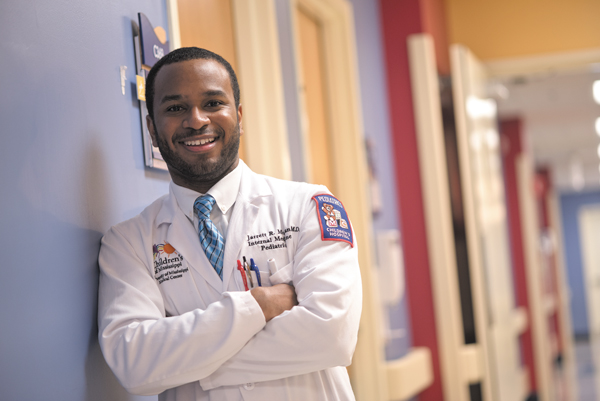
Dr. Jarrett Morgan
Dr. Jarrett Morgan, a second-year resident in medicine/pediatrics, has one regret about his early days at the Medical Center.
“Looking back, I wish I had known the importance of teamwork,” Morgan said. “It is something that is reinforced to me every day in my life as a resident.”
During his first year of medical school, the gross anatomy lab was divided into groups of three, with each group responsible for cadaver dissection. Each person had a certain role: one would dissect, one would read from the guide and one would either assist with dissection or discuss the goals with the professor.
“Together, we accomplished our daily tasks, helping each other and learning in the process,” Morgan recalled. “It becomes easy in medical school to get sidetracked into thinking that this is an individual journey. Sure, we all want to do well, to make good grades and to get awards, but it is important to remember that we all need each other as we go forward into our individual fields.”
When it was the Madison resident's turn to use his scapel, he said he needed someone by his side to read from the textbook, telling him where to cut, or to help hold the body in place.
“I didn't realize at that time, but this was indicative of the spirit of the medical profession,” he said. “On a day-to-day basis, we, as residents, interact with nurses, pharmacists, social workers, fellow residents and attendings, among others. Each of us has a role to play and specific duties to perform.
“Residents call pharmacists for dosing and depend on nurses to administer those medications. Surgeons depend on physical therapists for rehabilitation after surgery. It is only by us working together that patients can receive the best care.” - Gary Pettus
‘Your class will become your family’
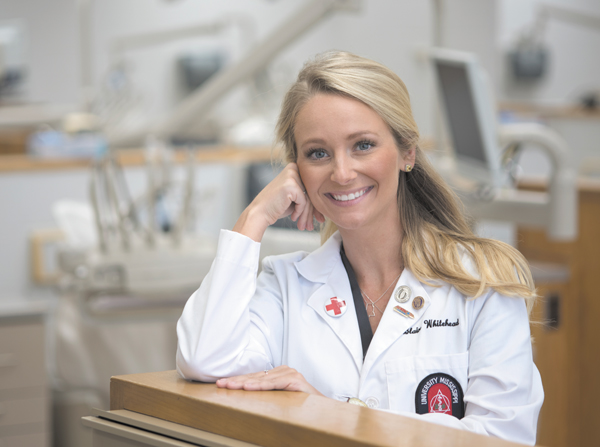
Blair Whitehead
Fourth-year dental student Blair Whitehead has a list of tips for students just starting their journey toward a D.M.D.
New students may want to get to know her soon, as there's only room for a few of her tips in this feature.
First things first, finding your way can be a challenge.
“You need to get lost at least a couple of times before you really get a feel for how big UMMC's campus is,” Whitehead said. “It's so easy to get lost. You will learn there are multiple ways to get to the same location, depending on whether you want to walk outside or inside.”
One key location to learn is that of a familiar fast food restaurant with golden arches.
“You'll get asked by patients daily where it is.”
Second, it's always good to know where to go for comfort food, and the Terry native has an idea.
“Chicken and dumplings from the cafeteria in the hospital are their best kept secret,” Whitehead said. “It's going to be like going to your grandmother's house, super warm and great flavor.”
Last but not least, by the time their fourth year rolls around, classmates are more family than fellow learners.
“Your class will become your family. You'll learn to depend on them for a lot of different things, some related to school and some not,” Whitehead said. “They become your best friends.” - Alana Bowman
‘Be confident in yourself’
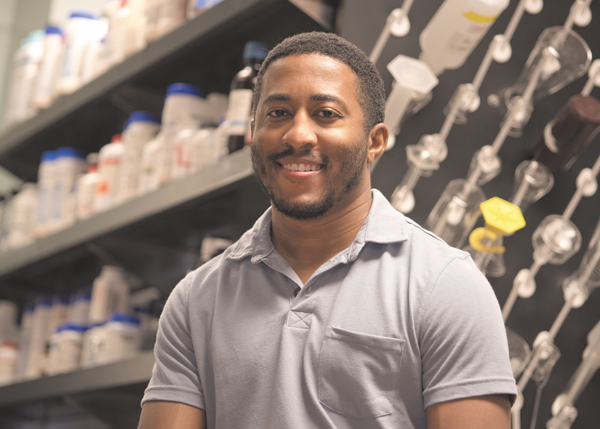
Kelsey Warren
Kelsey Warren wishes someone had told him not to get uptight about new classroom lessons when he began the medical laboratory science program at the School of Health Related Professions.
“I wish someone had said, 'It's OK if you can't understand some of the concepts and materials at first, and that you're probably not alone,'” said Warren, an Ocean Springs native who received his bachelor of science in biology from the University of South Alabama.
“I wish someone had told me to keep studying and learning, and that it will be OK the longer you're in the program.”
Warren, who hopes to work as a medical laboratory technician at a hospital after graduating in May, has words of wisdom for those beginning his two-year program.
“Be confident in yourself. Your hard work has led you to being accepted in the medical laboratory science program,” he said. “That means you have what it takes to be a success.” - Ruth Cummins
‘Practice with peers’
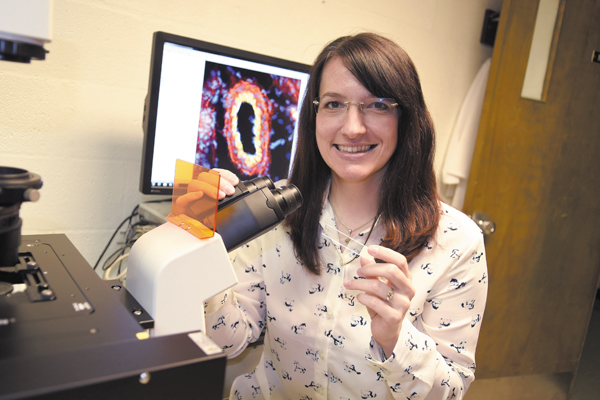
Marija Kuna
Marija Kuna wants new students in the School of Graduate Studies in the Health Sciences to know how to prepare for important public presentations, even if they are a bit nervous.
“Not everyone comes into graduate school confident in their speaking abilities,” said Kuna, a fifth-year biochemistry Ph.D. student from Valpovo, Croatia. “Have a friend sit through a practice talk before you need to present.
“Doing this will help you understand your strengths and weaknesses in public speaking.”
Graduate students present several talks about their research at conferences, journal clubs and thesis and dissertation defenses. The best preparation is practice.
“My classmates and I have spent hours together going through each other's presentations,” said Kuna, the 2016-17 Graduate Student Body president. “It's also helpful to practice with peers from other graduate programs because they can point out what parts of a presentation may need clarification.”
The sessions can also help students prepare for the after-talk questions from the audience. For example, there may be a professor who often asks a particular question, Kuna said, and having an answer ready can boost your confidence. - Karen Bascom
‘Be ready to work hard’
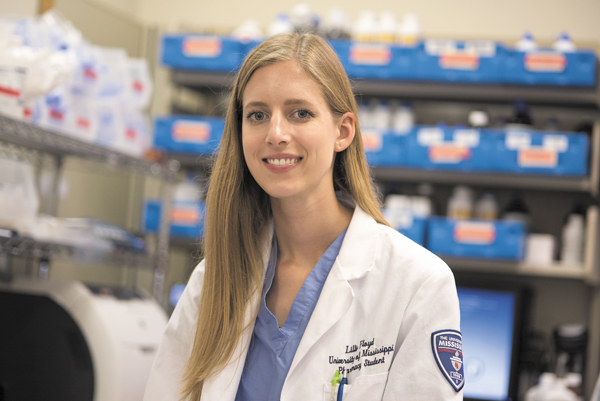
Lillie Floyd
Come May, Lillie Floyd will be acting on one of the diverse career options open to her as a graduate of the School of Pharmacy.
Floyd, of Jackson, wishes someone had told her more about those options when she was accepted into the program while on the Ole Miss campus. But she's educated herself since then and her future as a new pharmacist is bright.
Her advice to those new to her program, which generally includes three undergraduate years and four professional years of study?
“Be ready to work hard from the beginning,” Floyd said. “Try to manage your time wisely from the beginning, because your academic workload always builds as the year goes on.
“Get involved in organizations early on in pharmacy school, especially if you're interested in pursuing a residency, but also so you'll have something to do other than studying all the time.” - Ruth Cummins
‘Take time out to exercise’
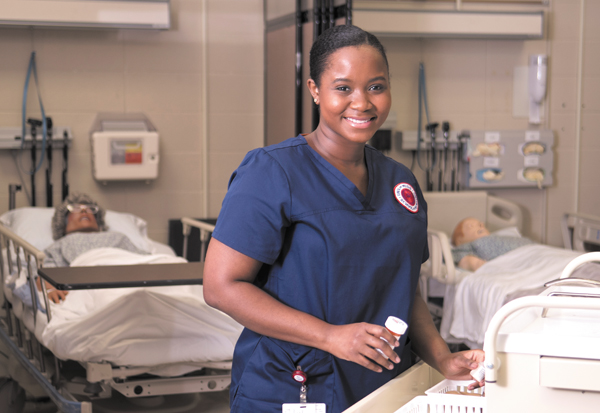
Lovel Lockhart
Making friends in the School of Nursing is important for new students, said Lovel Lockhart.
“Most professions in the medical field require teamwork and cooperation from all parties,” said Lockhart, a native of Pointe Michel, Dominica.”I know at times it is difficult to make friends in a new setting, especially if you are new to the area.
“It is vital, however, to put one's best foot forward to build bonds with one's classmates. Your classmates will be there for you the most and they will also understand your situation the most as they are going through it as well. It is important for the class to work as a unit so they can support one another in times of difficulty.”
Also, Lockhart said, new nursing students should take advantage of UMMC resources, from tutoring to therapy.
“These tools have been developed to help students while on their journey to their degree. Hence, we should make use of them as much as possible.”
Another tip: Take a break from books and school once in a while.
“To keep one's mental health, students should designate a day free of schoolwork when their minds can be at rest,” she said. “It is also important that students do not allow school to take over their entire life. They should always make time for themselves.
“They should take time out to exercise and eat healthily as their health should be their number one priority.” - Annie Oeth


